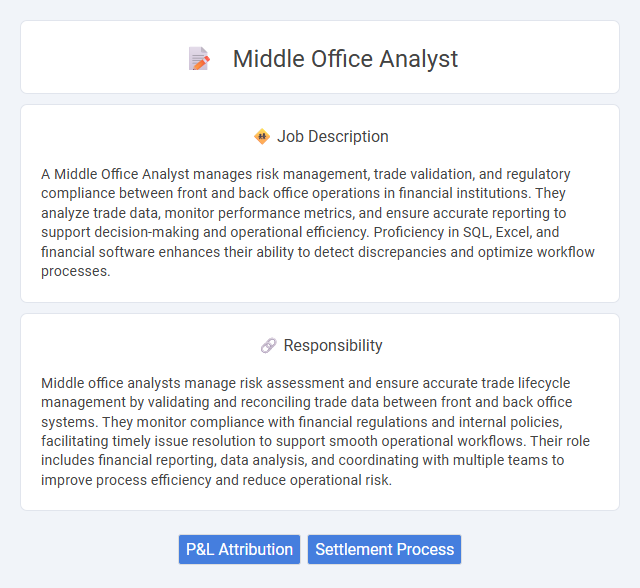
A Middle Office Analyst manages risk management, trade validation, and regulatory compliance between front and back office operations in financial institutions. They analyze trade data, monitor performance metrics, and ensure accurate reporting to support decision-making and operational efficiency. Proficiency in SQL, Excel, and financial software enhances their ability to detect discrepancies and optimize workflow processes.
Individuals with strong analytical skills and attention to detail are likely to be well-suited for a middle office analyst role, as the job often involves monitoring risk and ensuring accurate trade processing. People who thrive in structured environments and can effectively communicate between front and back office teams may find this position fitting to their strengths. Those who prefer fast-paced, high-pressure settings with clear procedural guidelines might have a higher probability of success in this role.
Qualification
A Middle Office Analyst typically requires a strong background in finance, economics, or business administration, often supported by a bachelor's degree and relevant professional certifications such as CFA or FRM. Proficiency in data analysis, risk management, and financial modeling, along with advanced Excel and SQL skills, is essential to efficiently monitor and reconcile trade activities. Strong communication and problem-solving abilities enable effective collaboration between front and back-office teams to ensure accurate transaction processing and regulatory compliance.
Responsibility
Middle office analysts manage risk assessment and ensure accurate trade lifecycle management by validating and reconciling trade data between front and back office systems. They monitor compliance with financial regulations and internal policies, facilitating timely issue resolution to support smooth operational workflows. Their role includes financial reporting, data analysis, and coordinating with multiple teams to improve process efficiency and reduce operational risk.
Benefit
A Middle Office Analyst role likely offers significant benefits including enhanced financial risk management skills and improved data analysis capabilities, which can increase career prospects in finance. The position probably provides exposure to cross-functional teams, fostering strong communication and problem-solving abilities. Access to industry-leading technologies and tools may also support professional growth and adaptability in a competitive market.
Challenge
A Middle Office Analyst position likely presents the challenge of managing complex financial data flows between front and back office operations, requiring precise attention to detail and strong analytical skills. This role probably demands the ability to identify discrepancies early to mitigate risks and ensure smooth transaction processing. Candidates may often face pressure to quickly resolve issues while adapting to evolving market and regulatory conditions.
Career Advancement
Middle office analysts gain critical expertise in risk management, trade support, and compliance, making them essential to financial institutions. Mastery of data analysis, regulatory frameworks, and communication skills positions analysts for advancement into senior middle office roles or transition into front office positions such as trading or portfolio management. Continuous professional development, including certifications like CFA or FRM, significantly enhances career growth opportunities within investment banks and asset management firms.
Key Terms
P&L Attribution
Middle office analysts specializing in P&L attribution play a critical role in ensuring accurate profit and loss reporting by dissecting revenue streams and cost centers. They collaborate closely with front office and risk teams to validate trade data, monitor daily valuations, and identify discrepancies that impact financial statements. Expertise in financial modeling, derivatives, and risk management systems is essential for delivering actionable insights and maintaining regulatory compliance.
Settlement Process
A Middle Office Analyst specializing in the settlement process ensures accurate and timely confirmation, matching, and settlement of trades across equities, fixed income, and derivatives markets. They monitor trade lifecycle events, resolve discrepancies between counterparties, and liaise with front office and back office teams to mitigate settlement risks and optimize operational efficiency. Proficiency in settlement systems, regulatory compliance, and reconciliation tools is crucial for minimizing transaction failures and ensuring seamless post-trade workflows.
 kuljobs.com
kuljobs.com